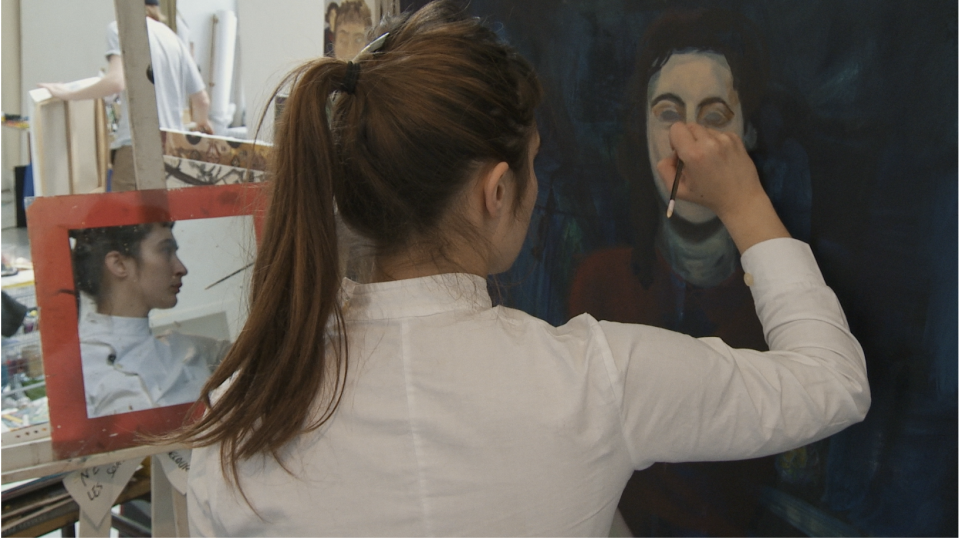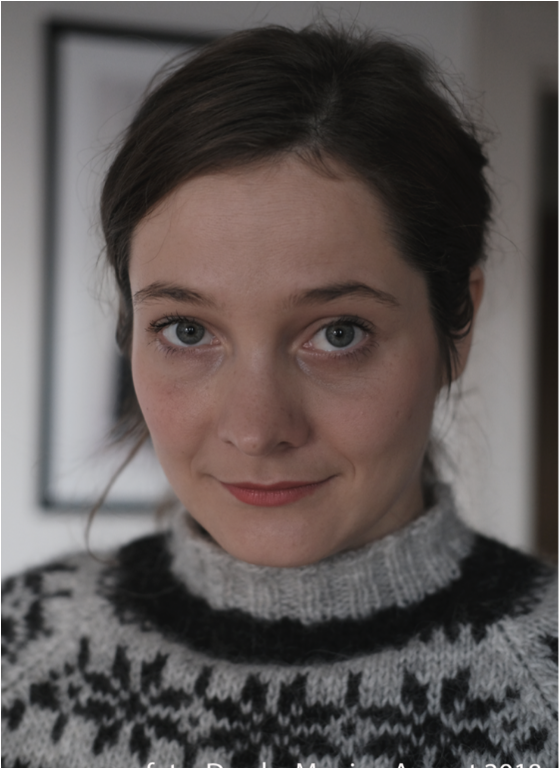Oscar-Contending Documentary ‘Apolonia, Apolonia’ Centers Captivating Artist And The Female Gaze

There’s a hypnotic quality to Apolonia Sokol, the Parisian artist and star of the Oscar-contending documentary Apolonia, Apolonia.
The word “star” is used advisedly: Apolonia captivates the attention – especially in moments of stillness — as effortlessly as an icon of cinema. Her presence transfixes, even when she’s looking off camera. Such is the mystery of personality.
More from Deadline
Danish director Lea Glob (pronounced Globe) was a film student when she first met Apolonia in person; the setting – Paris, 2009. Their initial encounter took on a vaguely fairytale character.
“She told me ‘Just come to this address, 35 rue Lyon and call my name,’” Glob recalls. I’m like, ‘Okay, is there a buzzer or something? Could we…?’ ‘No, just call my name — twice — and I will let you in.’ So I found myself — very stupid with ‘film school’ written all over my equipment… She would put herself into a theater play constantly like this.”
There was every reason for Apolonia to be at home in a theatrical milieu – she grew up in an actual performance space, the daughter of Bohemian parents.

“What I didn’t realize is that in this theater, it was a philosophy that anyone who walked into that door was considered to be an artist,” Glob says. “It was no matter if you wanted to rehearse a play or if you were just living in the neighborhood. This was about the personal creation as a celebration of human spirit. So that was the philosophy.”
When artist and filmmaker met, Apolonia was a student at the prestigious École nationale supérieure des Beaux-Arts in Paris, one of many talented young people hoping to beat the odds and forge a viable career as an artist. It was a life on the edge, in many respects – Apolonia’s family had a past history of expulsions, including ancestors who were deported from Belarus to Siberia, making it thence to Poland and later to France. Developers were constantly on the verge of grabbing the theater building where Apolonia lived, and forcing her out.
Despite constant economic uncertainty, she exuded a freedom of thought and movement.
And her tableaux were deeply expressive – often portraits depicting women she knew. Apolonia, Apolonia unfolds somewhat like an unspoken pas de deux, with the director narrating the course of the artist’s life over more than a dozen years – as Apolonia suffers setbacks, then apparent breakthroughs, moves to New York, then to Los Angeles, in pursuit of artistic opportunity.
Glob, reserved and observant by nature, contrasts with Sokol, who appears incessantly orbited by confidantes, friends, lovers. Director and protagonist function, one might say, as alter egos, as yin and yang to each other. Glob doesn’t reject the analogy.

“At one point when we are filming and Apollonia is painting herself in the mirror, we are both doing a painting and a film on the same subject,” she notes. “And I remember when Apolonia’s teacher was doing one of the first critiques and he said, ‘Your world is so filled, so filled with objects, it’s so filled with friends, nightmares, dreams.’ And it was crazy because he was describing the images that I was recording, in a way. So it was like this meta thing.”
Scenes in Los Angeles provide a sinister element in the film, as Apolonia is courted by a Mephistophelian figure in the art world, one Stefan Simchowitz, a big shot who orders her around and appears intent on colonizing her talent for his own pecuniary benefit. He’s the type of guy who, when he coughs, doesn’t bother to cover his mouth.
Will Apolonia escape his clutches or lose her soul? (Will she escape Harvey Weinstein’s clutches, for that matter? Yes, the then-untouchable movie titan makes a near appearance in the film).

As Apolonia rises in the art world, Glob’s life evolves; she marries and becomes pregnant. In this subtle cinematic two-hander, the director represents the path not taken by Apolonia, into motherhood. But Glob’s journey almost ends there – she develops a near-fatal infection after giving birth. When she voiced concerns to hospital staff she was ignored.
“Even though I asked for help, it wasn’t discovered,” Glob says. “If you alienate people, for instance, women, and you have these false images of let’s say pregnant women, that they’re hysterical, you don’t listen. And in a healthcare system it’s really dangerous.”
In their own way, in this pas de deux, Glob and Sokol have circled the same reality – the pernicious effect of living in a society dominated by the male gaze and male prerogatives.
“I understood something,” Glob says about her experience in the hospital seeing her personhood as a woman denied. “I think how the relationship between the images of our bodies and the words you tell on people, how that really is actually a kind of violence. It was important also to take these taboos on the body and for me to bring that into the film,” through Apolonia’s art.

Apolonia, Apolonia centers the female gaze – both of the filmmaker and the artist in her work. Sokol depicts the female body without shame – not as objects of beauty for the male fantasy, but as frank, sometimes stark corporeal beings.
“I really wanted to invite people into not only watching a woman and her journey from a distance,” Glob has said, “but also to think with us, Apolonia and me, as we matured, and to be part of that experience of going into this life, taking these steps that you do when you are young, navigating these notions of status and different starting points in life as a young woman and artist.
“I think if we edited the film without my own story, the film dramaturgy of ‘a woman overcoming obstacles’ would have sent us in the wrong direction, and this is not the story I wanted to tell.”
Apolonia, Apolonia earned the Best Documentary Award at last year’s International Documentary Festival Amsterdam (IDFA), as well as prizes at festivals in Hong Kong, CPH:DOX in Copehagen, Sofia, Bulgaria, Gothenburg, Sweden, Artdocfest in Moscow, and Millennium Docs Against Gravity and Łódź Film Festival in Poland, among others. It was nominated for Best Documentary at the European Film Awards over the weekend.
“I had to grow as a person to complete this film, in a way,” Glob has said. “From sexuality, to grief, to love, to sex, to ambition, to doubt, to suicide, to religion. Apolonia was challenging everything. And at the end of the day, that’s what I am most proud of with this film. We are not evading taboos, we are bringing them to the fore, and I hope we do that with care.”
Best of Deadline
2023 Premiere Dates For New & Returning Series On Broadcast, Cable & Streaming
2023-24 Awards Season Calendar - Dates For Oscars, Emmys, Grammys, Tonys, Guilds & More
Sign up for Deadline's Newsletter. For the latest news, follow us on Facebook, Twitter, and Instagram.


